Our presentation to the Matrix Success Network inspired some very interesting questions. Engaging such well-informed and experienced investors really showcased Water On Demand in a complementary light! And if that rarified setting spotlighted WOD's high level structuring, the segment we played from MD Felecia Froe's podcast laid out just how democratically its whole strategy rolls out to connect with everyday investors… With a Founder's Round that's filling rapidly and a Regulation A offering launching soon, is there a place for everyone in Water On Demand? Find out in the replay!
Transcript from recording
Opening
Dan Early: I think it's very indicative of the trend, of the major trend we're seeing in the infrastructure world where end-users, public utilities want these 100 year lifecycle solutions for the structures. And that's what the EveraMOD is. It's a turnkey single point of delivery infrastructure solution that happens to have a 100 year structural service life. Our methodology, our design methodology and our manufacturing approach and our single point of delivery model is very unique to this industry. We are doing things in the industry that are different from the conventional design and procure model around precast concrete or cast in place concrete, these very clunky, archaic old delivery models. It's not unlike comparison to the modern electric car or some of the things you're seeing, some of the evolution you're seeing in the manufacturing world.
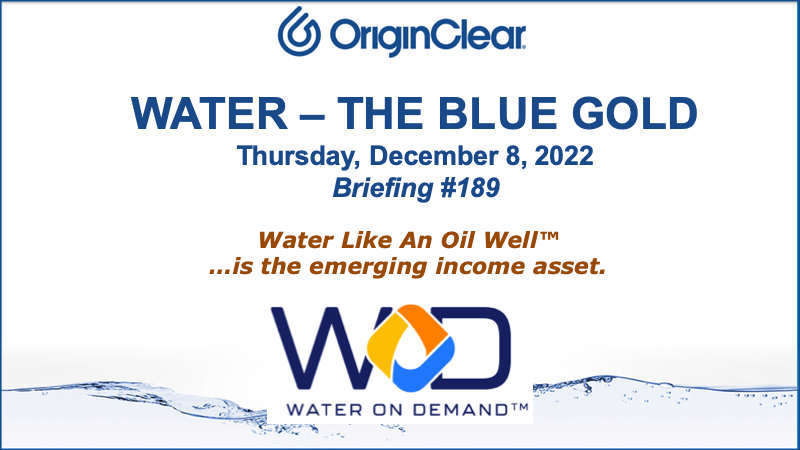
Introduction
Riggs: Welcome to the 189th CEO Briefing on the 8th of December. And I'm going to do some of the honors here as people arrive. Good evening, Robert Baxter. Welcome. All right. So Water — The Blue Gold. Thursday, December 8th, 2022. Briefing number 189. Water Like an Oil Well™ is the emerging income asset.
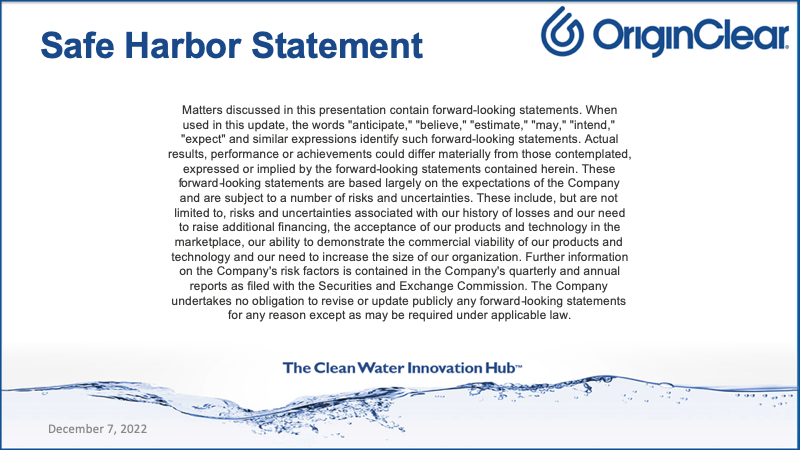
So, of course, the usual safe harbor statement.
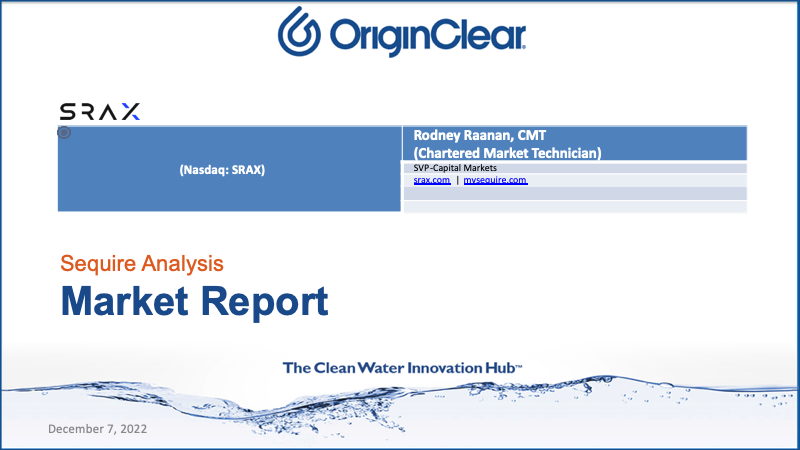
And let's jump right into it. Market report from we have a relationship with a company that ticker symbol SRAX. They have a product called Sequire. It's a way to access your own investor database. And then that way you can communicate with that database in real time. It's very powerful. Anyway, so they have an analyst who sends out these things and they're pretty good actually. So I wanted to share a little bit of it right now.
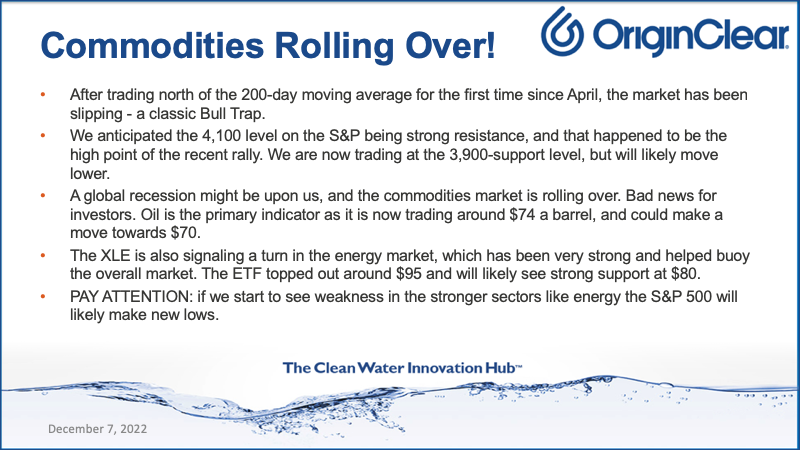
First of all, the commodities are doing weird things. Earlier this week, I bailed on commodities. I was done. I was in XOP, which is the exploration ETF, and I was like, Whoa, this thing went weird. And it's strange because oil is supposed to be doing well anyway. Oil is a primary indicator. Now trading around $74 a barrel. Could go towards $70. Energy market also has topped out and is pulling back. If we see weakness in the stronger sectors like energy, the S&P 500 will likely make new lows. I just don't trust the stock market right now. It's it's very skittish. Right. You know, it's very political. It's what the story is. All right.
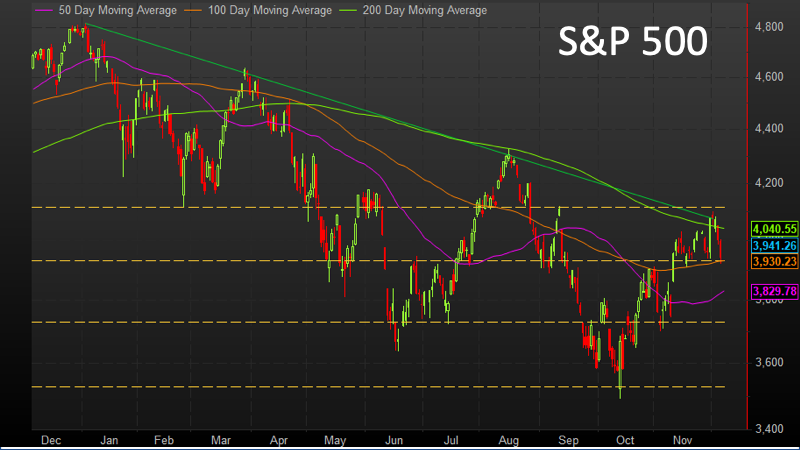
Let's take a look at some graphs here. Use the S&P 500. Well, you know what? This is not a great trend since December. This is and it's not it's now flattening out. It was recovering out of mid October, the low and now it's starting to flatten out again. So not perfect.
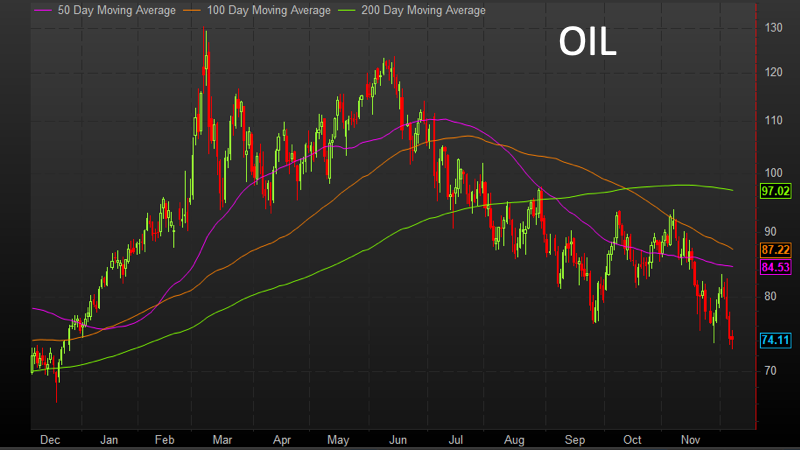
Here's oil. And oil is now that's I believe that's Texas. I could be wrong, but I believe that's Texas. Anyway, so, well, it was topping way back in February. It was way up there. And that is proven to be problematic for the oil industry. Good for inflation, good for the Biden administration. It's going to allow them to replenish the Strategic Petroleum Reserve. But from an economy... It basically reflects weakened demand.
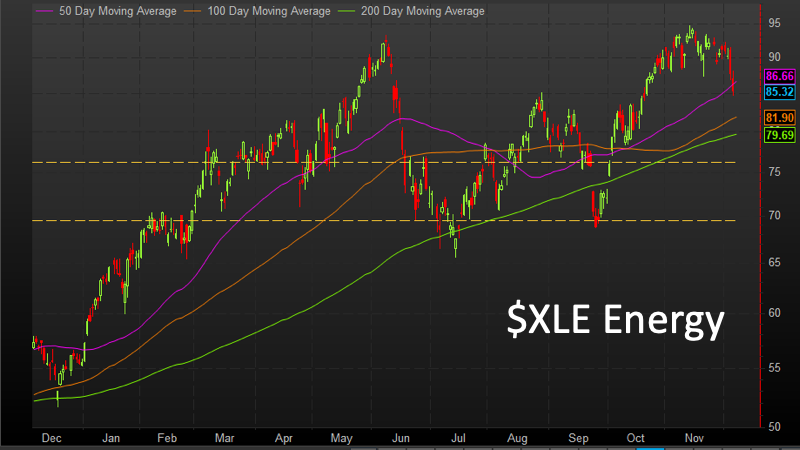
Here's $XLE energy stock and you see it took a serious drop after doing really well for some time. So I think we are not going to be having good times,
Tom Liakos says. "Good evening, everyone." And good evening to you. All right. So that's essentially it reinforces what we're saying, which is that anything that's tied to economic productivity is going to have trouble. Fortunately, we appear to be on a different level altogether.
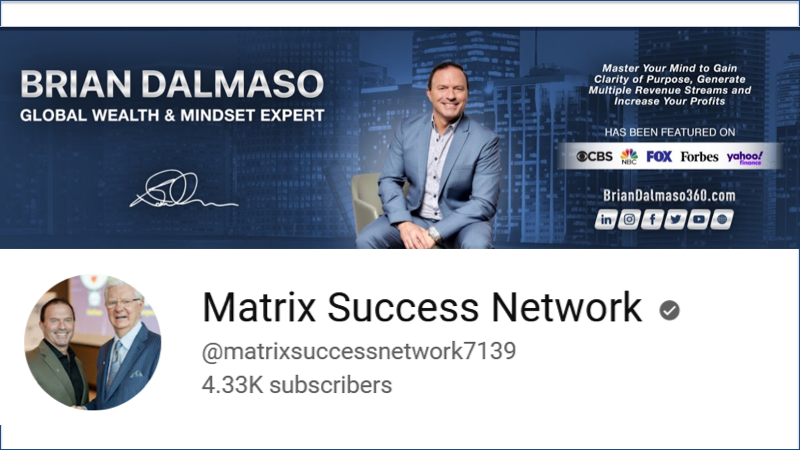
Two days ago, at the kind invitation of Ivan Anz, who is deeply involved with this network, we were invited onto the Matrix Success Network and the amazing Brian Dalmaso. So here's a little excerpt from that. I'm going to play just for fun. And here we go. There were two shows. This is the Elite 100, which is the smaller group, I think, and that was without a slide show. And then that night I did a second one with a slide show, and we'll play the slide show one next week. Give you an idea of how it's different. Okay, let's get this going.
Start of presentation
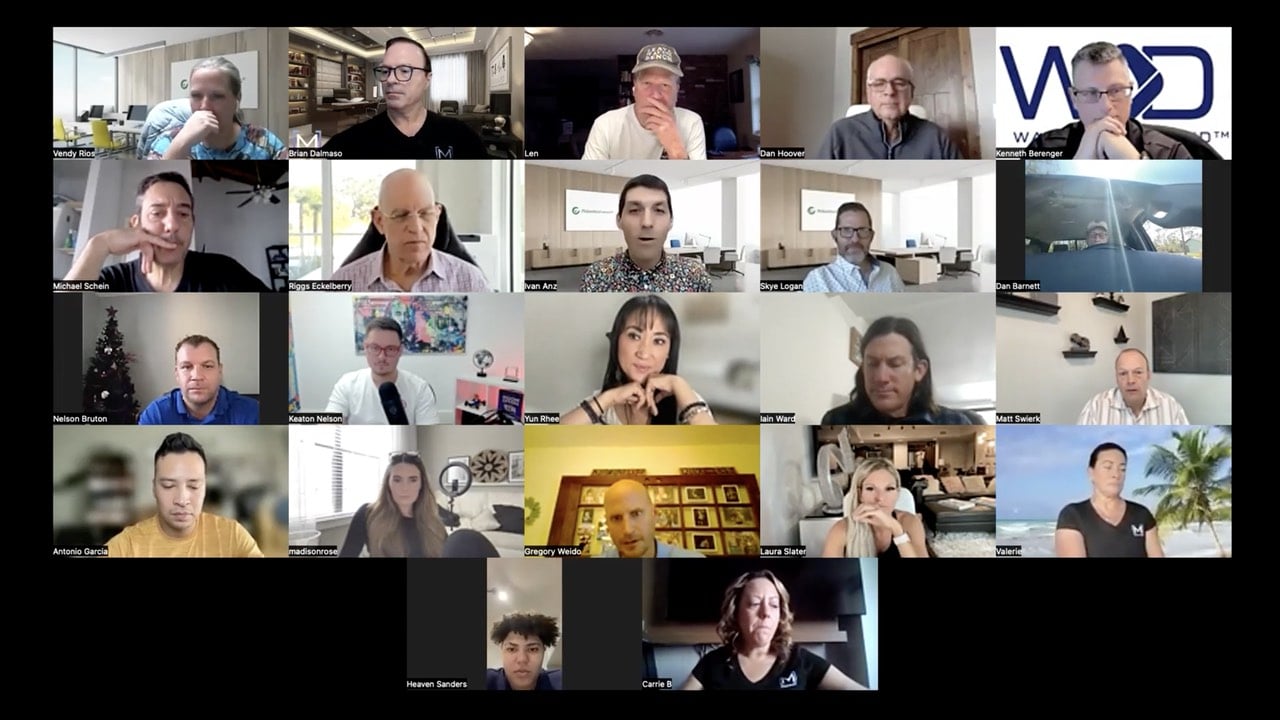
Brian: All right. Good afternoon. Good afternoon everybody. Welcome to the Elite 100. Great to see you guys. Hopefully everybody's having an amazing week, Mr. Ivan. Why we are all here today?
Ivan: In the year 2020 I was expanding PhilanthroInvestors® guys, and we started with housing in the year 2009 in Argentina. And then we went to the United States in 2014. But then 2020 I had this huge realization that I really wanted to do something with water, water, water. I wake up talking water, sleep, go to sleep, you know, water and wake up water. I was thinking water all day. I don't know why, but I was thinking water all day. And, you know, I was one day in the Internet and this comes up, you know, "Water the New Blue Gold."
And I realized, like, what is this? And so I go to a webinar and I met my now very good friends, Mr. Riggs Eckelberry and Kenneth, Ken Berenger, that are talking about that water is the next blue gold, and they're talking about that water is, all the problems that water has on the planet and are sharing the most innovative technologies and the most innovative areas on how it's possible to shift the water condition on the planet to exactly how it was before humans came to Earth.
And so I want to now open to you guys this knowledge that I personally learned and personally involve myself with my own money with more than seven figures. And I say, okay, I want to open this to my friends. And that's why we're here. And I want to introduce you to my dear friend and Mr. Miracle number three and four, Riggs and Ken. Riggs is the CEO and founder for OriginClear. He has been a, he has the license to drive any type of vessel in any ocean. So but most importantly, he's a great skier on mountains. He loves to ski. He wants to take me to a higher level of a skiing. Ken has been an is an amazing entrepreneur also has been in the Wall Street world for 30 plus years. And also, you know, he he loves the finance world and he's a genius on that. So my friends, Mr. Riggs Eckelberry and Ken Berenger, thank you, guys.
Riggs: Thank you so much Ivan.
Ivan: You are welcome here, amigo. I want everybody to know about how OriginClear is the Water PhilanthroInvesting™. Why? What are they? What is the vision? What are the opportunities? How is it that we are two Xing, three Xing, four Xing investors money in the you know, some of the PhilanthroInvestors that have joined us and why water is the the future and the future gold and the benefits that exist and then open it for questions that people may have. We have personally already we have like PhilanthroInvestors with more than $5 million with you guys. So I would like everybody to know the reason why and why people is joining you guys and so on.
Riggs: I just wanted to set the stage here. First of all, I came out of tech, so I'm accustomed to very fast moving situations. You know, I love the dot com and even better, after the year 2000 it got even more fun. And it's a long story I won't get into, but I ended up as a CEO of a company in the water industry and all of a sudden everything went eerrrrhh, because water is a very slow moving space. There's a number of reasons, but the main one is, it is highly government managed, right? It's primarily a public activity and so it's a lot of just, let's just keep it stable. Let's not mess with what works.
Unfortunately, things aren't working very well, not because the municipalities aren't trying, but they are not getting the funding. Since 1961, they have consistently failed to be funded and today the annual deficit each year is $75 Billion a year, digging a deeper hole in our central infrastructure in America alone. And forget about the rest of the world. I mean, let's not even talk about South Asia and so forth. Those places are disasters.
How do we solve this problem? How do we, how do we change things? And we worked very hard for a number of years to find how to, how to move the needle. Ken joined, frankly, really, the big change occurred in 2018 when a phenomenal team came on board. I was able to finally get the bench I was looking for. Ken came on board as a financial genius and he is co-creator of the eventual solution I'm going to tell you about.
In addition, we since 2016, I had realized that the future for this horrible situation with collapsing infrastructure that nobody cares about, by the way, right? Flint, Michigan, or whatever, you know, Jackson, Mississippi, whatever. Compton, California. Note these are all poverty areas. So maybe that gives you a clue as to why nobody cared very much. But nonetheless, those are little canaries in the coal mine. And there's a big problem with central infrastructure. And the solution then was to decentralize. And I became a big apostle of decentralized water. Meaning, take the load, if you can't fund the central system, then unburden the central system. That's the only other thing you can do.
And that has now become a thing. Decentralized water has become extremely understood. Even the EPA talks about it now. It's sort of the thing to do. What does that mean? That means if you're a brewery and the water district is not taking care of you and they're like, no, we've got no capacity. Send it somewhere else. And you're now you're trucking your water to another county or whatever. You can now install a system in your brewery that will take care of your wastewater problems and enable you to do something America doesn't do, which is recycle.
It's a scandal that in America we recycle only 1% of our water, and yet we have legendary droughts going on. Doesn't seem to make a difference. Why? Because again, old infrastructure. So that is the setting. And so in 2018, we acquired a technology for these compact drop in place systems called Modular Water Systems™, and that was an important enabling solution.
Riggs: 2020, Ken and I looked at each other in the middle of COVID and went, "What do we do now?"
Ken: Oops.
Riggs: Because oops, oops is a big word because organic growth in water is 10 to 15% a year. And at that rate, you're not going to save the world. So what do we do? After lots of incredibly hard work, we came to the realization that it's the money, stupid. If you can make it capital free and just replace the city, be a proxy for the city. And now you just pay the meter and you're paying us. Then all of a sudden you can just have people sign service contracts and they're up and running. And that became what is known as today's water on Demand.
Very quickly to roll this up. And the interesting thing about Water On Demand is, I saw a recent quote by Elon Musk that the entire challenge is scalability. Right. I don't know if you guys saw that, but 10 to 1000%, 10,000% scaling is the challenge. Prototyping is good enough, but you've got to get to scale. And I think everyone I've heard in Mastermind is about this. So how do we scale Water On Demand, which is basically a concept of water as a service. It is a water as a service concept. But we are operating, water as a service, nothing new about it, but it's applied to very large installations like entire islands.
We operate at the mid-market where all the bulk of the installations are and most of the problems are and the least capital there is and the least expertise there is. So the biggest need, biggest group and biggest potential money. Now, how do you scale it? Well, you don't go there and build every single water system. You delegate that and then instead you scale at the highest level of fintech by empowering financial centers all over the world to do the same thing for their region. So it's a financial network that then commissions projects for clients everywhere and commissions the local water companies to do this.
And therefore it creates a whole lot of win win for the water industry and it enables investors for the first time to come in and put money into water, as we say, Like an Oil Well™. So they get, they get an annuity, they get for the first time, people can actually make money from a water investment backed by assets and so forth. So that's the very short story of what we've done. Now, the final piece of it, which I can only say a small amount because it is an NDA issue, but we did announce that we are investigating merger with a SPAC, and that is something that we can neither confirm nor deny. But this is kind of the end days for SPACs. And if a SPAC is going to find find an exit, it's going to happen in the next three months, it appears. So we are playing with that too, and it's very exciting. So that is the top line of what we are and I'm happy to answer questions and take it from there.
Brian: Probably for this group outlining the basic overview of what it is from an investment point of view, because everybody here is investors.
Riggs: Good. And I'm going to turn it over to Ken. Basically, there's two levels. One is the level which any accredited investor can play and there's no NDA required. And then there's this interesting second layer which requires a little bit more. Generally, it's open only to existing investors. But but through this relationship with Ivan, of course, we're happy to discuss it. Ken, over to you.
Ken: The structure, I designed it for me. You know, I'm a chicken shit with my money, but I want to make a lot of money. So it's one of these things where I wanted it to have some foundation. I wanted it, I wanted it to have a foundational apparatus. So the actual capital, the foundational capital actually goes into water treatment equipment. So this is, literally you own a utility, you're a private utility, you're going to be a revenue sharer, a revenue participant of 25% net profits for life in an actual private water utility.
Now, to further protect the investor, it's going to be like a mutual fund. One system may outperform another. A group of systems may outperform other systems, but the dirtier the water, the better the returns. That's just the way it is. I'll give you an idea, a $300,000 system, those of you who are in commercial real estate, who do commercial real estate financing, figure out the cap rate on this, a $300,000 piece of equipment will produce 20,000 gallons of clean water a day from something that's being charged $75 per 1000 gallons. So 20,000 gallons a day, 365 days a year. 20 years. I'll save you the trouble. It's $10,950,000 in revenue on a $300,000 piece of equipment.
So the idea is getting the company to Nasdaq, being able to simply go to a bank and finance that. They'll finance that all day long. These guys are financing real estate, commercial real estate projects with a portion of that kind of a cap rate. So it's very, very attractive in the long view.
But so anyway, so the money goes foundationally. It goes into a private utility asset that throws off of that rate of return. What's interesting is the participants in this early stage are pre institutional. Your angels, but your angels usually mean that you roll the dice and you hope there's an IPO one day, ten years from now, when you forgot you had the investment, right? Water On Demand will hit the Nasdaq, and I can get to why that becomes a far more confident statement under NDA.
But it's going to hit the Nasdaq as the world's first mid market water as a service fintech with the ability to globalize point of view, infrastructure free, pay per gallon private utility marketplace for the small to midsize end user that is an unserved market. This is equitable to creating an online marketplace for shopping all over the world. When Amazon transitioned from books to everything. OK? Or monetizing real estate properties using the cloud with Airbnb,
Now picture for a minute, two of the largest companies, you know, Airbnb and Amazon and imagine how large they would be by scale if Airbnb actually didn't just monetize your rentals. So Water On Demand operates in the flow. Now what is the flow? The flow is where you want to be. It's transactions, right? It's how banks make their money. They take my money, lend it to you, and they charge both of us. Isn't that a great business? Water On Demand is in the flow. It actually makes money off the movement of capital in the enforcement of contracts.
But imagine now how big a company Amazon would be if it owned all the retail outlets that it facilitated, that it monetized. Imagine how big Airbnb would be if it owned the real estate that it facilitated transactions on. That's essentially what Water On Demand will be. It starts its life immediately monetizing the pay per gallon decentralized water treatments. Right. So you're going to be a founding investor in this. You're going to get founders shares, but make no mistakes. This is infrastructure. The infrastructure will be built by someone. It will be built by Modular Water will be built by PWT (Progressive Water Treatment). But we can we can cover a fraction of 1% of the global water market. It's that massive.
So we're going to essentially license this ability for anyone who wants to build inside of our license and distribute these throughout the world. And that's the scale, that's the infinite scalability. So it is infrastructure, but it's the monetization, it's the cloud based monetization of water as a service that Water On Demand operates in. You're going to be a founding player in that. And the early investors in fintechs, if you look them up, look up what the first round made for Airbnb, look what the first round made for Stripe and fintechs along those lines and the numbers will boggle you.
I'll spare you the numbers because you just you'll have to go check them anyway because they're ridiculous. But they took ten years and they piled people's venture capital money on top of the founders. So we've combined that exciting upside with a very, very near term, we think, liquidity event. First round is you're a utility owner participating in life long revenue. The second component is 100% of what you put in. You will control that amount of the founders round of Water On Demand stock on an IPO. So let's say it's $100,000 investment. You got $100,000 that's in equipment, not quite 100, because we're using some of the capital that will change.
Riggs: It is 25% on your entire investment.
Brian: OK 25. That's what I was looking for.
Riggs: It's perpetual and is paid quarterly.
Ken: Correct.
Brian: Annual, Quarterly, OK.
Ken: All right. And we expect those royalties to begin in about two quarters, realistically. So prior to the two quarters, there's two massive, I think, liquidity events. So the first one is to Water On Demand founders round. You will be positioned in the world's first fintech for water as a service with the ability to globally disrupt what is currently $1,000,000,000,000 business. If you could provide water as a service to places that can't afford the purchase infrastructure, that's the rest of the planet. That's the other 90% of the planet, you could conceivably turn the water business into a 5 trillion. So the total addressable market is 5 trillion. Only 1 trillion is currently occupied. Water On Demand can fill that massive hole.
Brian: So, a 100k investment, we can expect roughly 25% a year paid out quarterly. What is this additional piece? What are you, what do we, you say we're kind of buying into...
Ken: It's an equity, it's an equity position in a founders round that's about to go public. And whether that happens in two years or four months...
Brian: Sure.
Ken: Right?
Brian: That's um, any idea what the percentage of ownership is?
Ken: Yes. The first $20 million will own 10% of the company.
Brian: And what do you currently add?
Ken: I'm just touching on 7 million.
Riggs: Here's the irony. This founders position is gratis.
Ken: Yes,
Brian: Right, it's given.
Riggs: Because what really underpins this is if you invested $100,000, you will get the royalty in perpetuity, even after you sell your shares, whatever, until Water On Demand is wound up. And additionally, we give you 150% of your investment in a publicly traded entity called OriginClear. So $150,000 worth of stock that is in a preferred class so that it converts at whatever later price it is. So if for some reason the price goes down, you don't get crambed. Secondly, we give you that an anti dilutive, pro rata percentage of the 10% that we've set aside for founders in Water On Demand. And so these three pieces are only there because you guys are the first and you're doing it before we have a commercial pilot.
Ken: And you're starting with 205, you're actually up to 205% when you start. That's because between the stock grant in the parent, which trades tomorrow if you wanted to, I mean there's a six month restriction. So let's just say in six months. And what we thought was going to be a very a much longer term intermediate term play with the Water On Demand listing. We now could, we have reason to believe it could be vastly accelerated. So there'll be a second very major material liquidity event within the next two quarters, at this at the time where we believe that those royalties will start to kick in.
What's exciting is this, the recent elevation of our of the Water On Demand, we're kind of getting that to the forefront, getting that listed, this eliminates the need for me to bring in any investors to acquire equipment. Because, here's what happens when you're, if you're on the Nasdaq and you have a two $300 Million market cap, which is still very small by Wall Street measure, you could easily go to a bank. I can show the pro forma for the Water On Demand fund, get a $300,000 piece of equipment, generates $11 Million again, pro forma, right? We don't know what we don't know.
But banks have been monetizing, banks have been financing real estate property with a fraction of that cap rate forever. So, I can now go to the banks and say, "Look, I need half a billion dollars and this will pay out about, based on my pro forma, just shy of $11 billion over a 20 year period." It's a 30 year loan or a 20 year loan, I think. I think so what would become, what was going to be a very slow uphill kind of knife fight to get to a certain critical mass, we can now, we can now globalize this very, very rapidly and only due to the very recent developments of the past 30 days.
Riggs: OK, but it's very important that we not rely on that. We get into material nonpublic information. And I would like to not have to move to Costa Rica. So, keep that in mind. So with that in mind, let's talk about, what is OriginClear role as it's developing. We've gone from being a company that was trying to add more value, add more value, pack it with value, which is a conglomerate concept, very common in the water industry, by the way. That's what it what they do, they grow by acquisition. American water works alone has $1,000,000,000 a year M&A budget because that's how they grow.
We realized that what the missing element in the water industry is it has no incubators, there's no incubators in the water industry because they just don't do it. You, you build your own company and you, you sell it to somebody else. And then you retire on a golf course. This is a different model which is a tech model. So OriginClear has now become a sequential launch company. So imagine this, we already have several properties in house that are very viable. Water On Demand is the first one. It gets launched through this undisclosed able way, but nonetheless it's being launched currently has an offering going.
And then we have another one and another one and another one. The OriginClear holders will be holders of a Y Combinator kind of asset and that becomes very interesting. So, no, you know, let's say Water On Demand gets on the Nasdaq, but OriginClear doesn't because of whatever. But we own most of of Water On Demand anyway, so it's a non issue. And so there's going to be accumulation of value in a sense of kind of a VC wealth, which is why OriginClear is a great investment amid all of this.
End of presentation
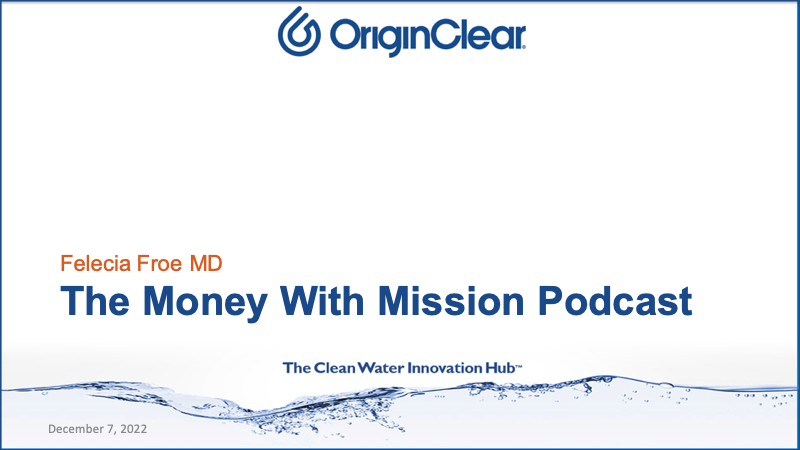
Riggs: That was fascinating. Very, very interesting and some great questions we're being asked. So we're going to continue right along here. We had a great interview last week with Felicia From, a doctor, and this is part two of the same. It's shorter than what we just heard. I think you'll like it. Here we go.
Start of presentation
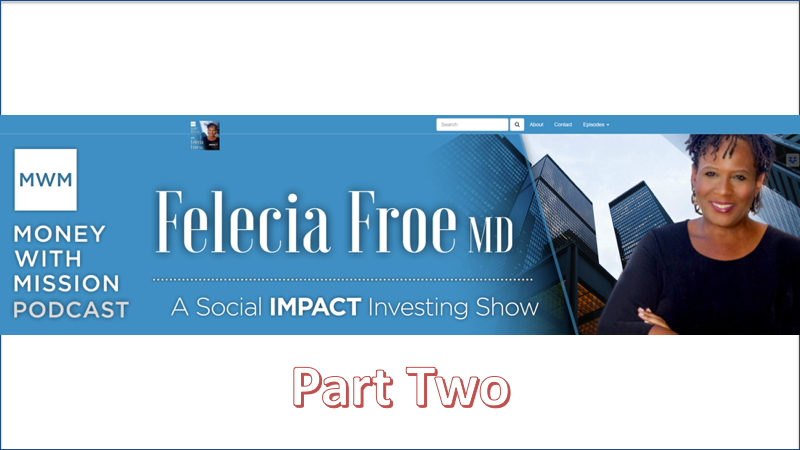
Felecia: I'm a developer. I want to build a construction, I want to build a big community of homes and businesses and I know that there's this water system and the water infrastructure, and I'm getting a hard time from the municipality about the water that's going to come from this place. The sewage that's going to come from this place. What kind of, what is Water On Demand? And OriginClear has solutions for that. And that's where the whole, the business of this thing is coming from.
And to me, where people who cannot afford the local home solution, the mission is, it's not just for me because I can, I can afford to do that. But the people in Flint, Michigan, and some people in even my neighborhood can't afford to do that. And if we're going to say health care is a right, then health care starts at water and food. So how do we make that more, I'm going to call it a social justice thing, really, because that's what it gets down to to me.
Riggs: Well, okay, let's let's address a couple of these things. First of all, you start talking about housing developments. We don't go below the level of a housing development. And there was we don't work with single family homes only because it's a commodity market that we're just, we do the business to business. And so for that, we're able to equip a housing development not only with incoming clean water to whatever level they want, the ultra filtration, which is that 0.2 micron moving on up eventually to reverse osmosis whatever they think, these different modules.
We've been pioneering that because as I was saying, we've been primarily focused in the wastewater business, but now we have a significant customer which is a high end hotel chain, and we installed the first one and that first one was designed literally two years ago before the Forever Chemicals were a big deal. So it doesn't have that module, but the second hotel does because that's being commissioned this year. So that kind of tells you how things are progressing anyway. So that is going to become our new product line called InfinityPure™, which is going to be all about that.
And you mentioned Water On Demand. Now, first of all, I want to make it clear that we do a lot of work helping businesses do their own water treatment. We build warehouses for a major direct marketing distributor. We build not the warehouse, but the actual water treatment for the warehouse. And water treatment for a up and coming car manufacturer and things like that, right? They are increasingly doing their own water treatment. That's a trend. And we do that, people, we bid that, they pay us, we do it and everybody's happy.
What we realized in 2020 when we really had, everybody had to look at their business model back then was that, you know what, we need to accelerate the process here. And a significant barrier is the capital. And if we remove the capital problem, and the water industry mentions this a lot as a problem, then we can accelerate it. So we can go to these customers, potential customers and go, "You've got a problem, just sign here and we'll take care of not just the money, but also the expertise." It's fully outsourced.
Water as a service, basically, and that's the Water on Demand initiative, which is now up and running in terms of funding coming in from our wonderful investors. And they, of course, are getting a return on their investment through royalties, etc., even when the money is not being placed in a water system which it's intended to be. It's being worked through lending, so forth. So it generates, we got to keep that money working because we know how cash is losing, losing value all the time, right?
Felecia: Right.
Riggs: So that's a very good program. It's growing and very, but very importantly, it needs to have a technology component. Because, one problem with, "Oh OK, we're going to go from centralized to decentralized..." Oh, wait a minute. Now we're going from big to small, and miniaturizing things is always a challenge. So back in 2018, we made an investment in a technology called that we that we branded Modular Water Systems™ with a major guru, Dan Early, wonderful man who had been doing this decentralization stuff long before it was sexy, 15-20 years ago.
And and he has these cool modular, Water Systems in a Box™, we call them. They're perfect for dropping into that brewery in the corner and no muss, no fuss, and you plug them in. So that's a key requirement to make it work, is you've got to have the compact water systems along with the the financing so that you can deliver a good service contract now. What's even more important for us is you're either going to be, in my opinion, either a financier or a builder.
Let's talk of real estate, for example, right? A lot of people, a lot of organizations, finance real estate and other people build or develop. Well, the it's much easier and faster to finance things than to build them.
Felecia: Yes.
Riggs: Here's your money.
Felecia: Yes.
Riggs: My job is done. Go build it. Five years later, the thing's done. So what we realize is that we can't be the only people doing the building on this new water as a service thing. And so we're starting to build a network of water companies in America, for starters. But our first partnership is with a company that is multinational, called Envirogen®, wonderful people, and they are very good at doing local operation and maintenance. So I don't have to rush off and maintain some system in Seattle. It's being taken care of.
So that is very important. It's also a great way to differentiate us. We call it our Supercharger network because it's unique to us. Once we have a bunch of water companies in a synergistic relationship with us, you know, getting contracts. "We've got a contract from Water On Demand isn't that, great." Then, they're not going to be so likely to do a deal with another water as a service player. So that's part of our deal. And then the final piece of it is at the very top level is to start to replicate Water On Demand financing centers. U.S. Now, but then future Tokyo, Singapore, Dubai, London, etc., doing the financing for their regional water requirements. And that's where it becomes hopefully a network effect.
Felecia: Okay, So I'm going to go back again to the Modular Water Systems. So if, so let's put this out here. Guys, I've invested in OriginClear and I'm excited to be a part of that, this whole environment, I'm investing in this and everything that Riggs just talked about. But I want to understand more and have everybody who is even thinking about it like, "This sounds like a really good thing. I should get involved in this." What they are actually, if they put money in, what are they investing in? They're investing in Water On Demand. Originclear, Inspire... What was the other company, the other company that you talked about?
Riggs: Well, Modular Water Systems right?
Felecia: Okay.
Riggs: And then we have Progressive Water, which is our but then yeah, InfinityPure, which is just a brand. That's built by Progressive Water, that's our Dallas operation. So, okay, let's talk about investment. First of all, until just now, we have only been able to take investment from accredited investors, which is a person who makes $200,000 or joint income 300,000 with cohabitant or spouse, or they have $1,000,000 in assets excluding their primary home.
Felecia: Right.
Riggs: Well that's... Okay, it's not quite the 1%, but it's awfully close. So which I hate, I hate this sort of elitist stuff. But that's what's been going on. And we have, the offer we have for the accredited investor gives them, a minimum of half of the money they invest, goes into water systems and they receive 25% royalties on their entire investment, 100%. They also get stock in OriginClear and they get stock in the new, this new Water On Demand subsidiary. So it's a very attractive offer for credit investors.
Why? Because this is the founder stage. We're still building the first pilot unit of Water On Demand. And so people have to take a leap of faith. And when they do, it's only right that they should get a really, really good offering. Of course, there's always risks, but we try to mitigate those risks. We can explain that in detail. But but we try, we try hard to mitigate those risks with these assets, for example, etc..
Now, things are changing because we have just filed for Regulation A offering, which is for unaccredited investors, and that is, people are buying stock directly in Water On Demand, common stock. And the great thing about Regulation A is eventually that those shares, that company can become public through the Regulation A process. It's not guaranteed, but it's designed that way. And so we we are launching that and that over time, the accredited investors will be, will be limited out.
Why? Because it's such a generous offer. We can do better by going to the unaccredited investors, just like political campaigns are so much more healthy if they go after small donors than the...
Felecia: Yes
Riggs: Similar concept. So come in with $500, 1000, 5000, whatever. You're limited to 10% of your annual income per year. And which means that let's say somebody can do 5000. It's a wonderful thing. They'll get shares and then eventually those shares may become a public company and then that's, Water On Demand will have the exclusive concession from OriginClear to do this water as a service. It's not going to be done anywhere else.
In other words, when we launch Water On Demand because we are kind of an incubator. We launch it, that's our water as a service play. And then we launch other things continuously. For example, the Modular Water Systems business unit, which is currently now will eventually be launched as a separate, separate company as well. And that's why we call ourselves the Clean Water Innovation Hub.
Felecia: Yes. Yes. I hope you guys kept up with that. Riggs said a lot in that little bit. There's a lot of information out there. If someone is... Has the Reg A started yet?
Riggs: Well it's been filed with the SEC, Securities and Exchange Commission. Typically it takes three, four weeks. I'll say conservatively, by early January, we should be able to be up and running. But we're about to put up a reservation page that people can do a non-binding reservation, put in their name. And that's going to happen so really the thing to do is for people to sign up, just as you did for the CEO briefing, and you get on our list and you'll start hearing about what things are. And I send out a weekly CEO update personally, that kind of keeps you up to date. So you'll hear about all that. And I love these because it's so. It's so democratic, right? That's the way it should be.
Felecia: So if you guys want to learn more about OriginClear, you can go to Money With Mission, go under opportunities, and it says become a PhilanthroInvestor®. And there's a whole page about a lot of things that PhilanthroInvestors are doing. But about halfway down the page is where it talks about OriginClear, water, and there's a lot of information there, and you can either even get to signing up for the CEO briefings from that page. So that's very important. And the more you hear, the more, just it's like everything else we do, the medical school, law school, all these things we do. You hear it a million times. You're like, oh, god it! Now it makes sense to me.
I've been going to the briefings for a long time, and more and more of it's getting more and more clear to me. The one thing I do know is we have a water problem. It's clear there's a water problem. And to just keep saying there's a water problem and not work, to come up with an innovative solution, which I think Riggs and his company OriginClear have done, it's not putting a Band-Aid on a problem. This is actually getting to the root of the problem and working to fix it, which is we need to do that with so many more things in our world. Just get to the bottom of it and fix it, not Band-Aid over the thing. I really love this and I'm going to be listening so much more and understanding. And we've, I've had so many conversations with, I don't know what Ken's title is, but with Ken, who is with the.
Riggs: EVP, executive vice president.
Felecia: Right, with Ken and he's a superintelligent guy, talks, is available. Everybody is just really, really easy to talk to. This is my first time actually having a conversation with Riggs. But like I said, we talked for 10 minutes before we ever came on the show and we could have talked more, but we both got to get on with our lives, right? This has been super, super exciting. I look forward to talking to you a lot more. Hopefully we can spend some time. Riggs is in Clearwater, so of course I'd want to go there instead of you coming to Tulsa.
Riggs: Hey, any time you know, it's a it's a beautiful, we're down by the water. You know, we escaped LA in June 2020. Couldn't be happier. And we're by the Intercoastal Waterway now. I mean Tulsa. I mean, if you can go over to Chickasaw Country, you can. It's a beautiful, just beautiful land over there. Right.
Felecia: There's some nice stuff. It's pretty. I'm just an ocean person, honestly. And I left Kansas City to go to Hawaii, actually, because I wanted to be near the ocean. And now I'm back in Tulsa and I moved back to I moved to Tulsa. My mom said, "I don't think the oceans near Tulsa."
Riggs: Really, Mom?
Felecia: You're right, Mom. Couple other things are bringing me here. But, you know, yes, I'm still the water person.
Riggs: Just can't wait to I. I love it so much. Oh, my gosh. Is the best.
Felecia: And I heard from another talk you were giving it. You're not just a moving water person. You're a snow person. Give me some frozen water, too, huh?
Riggs: Oh, I love skiing because especially these days, I love teaching the young ones how to ski because it's they get a true sense of freedom from it. Know they can go as fast as they want. Generally, nobody is going to stop them. And, you know, a body cannot go faster unassisted than on skis. Think about it.
Felecia: I don't like it. I feel very out of control. It's there's something about me. It's just like I just don't know that I can control this thing. We went skiing has been a long time, and I took my lesson and he says, What do you need to learn? A sudden you learn how to get up. That's what I need to learn. And you know, he said, you know, yes, of course we did that. And he said, if you lean forward, you'll never you'll won't fall forward. I'm like, I proved them wrong. Right after we were done, like fell right on my face, like whatever. Riggs Thank you so much for being here. I really appreciate it. It's been really fun.
Riggs: Felicia, it's been so interesting. Thank you. I wish you all the best with your your fine work and and backing up PhilanthroInvesting, which is a really important cause.
Felecia: Talk to you soon. Take care.
End of presentation
Riggs: As you noticed, Felecia came to us through the PhilanthroInvestors network. And in fact, I didn't really know this, But she has been a participant in these briefings. Stealth participants. She's listened in a lot.
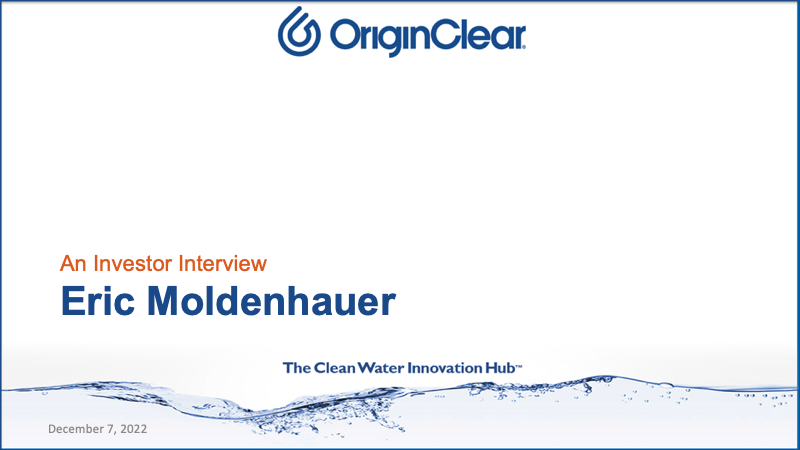
I'm going to wrap this up by playing an interview I gave today to an investor, Eric Moldenhauer. I think you'll enjoy it. It's brief, but it'll be fun. And then we will do our little freestyle things.
Start of presentation
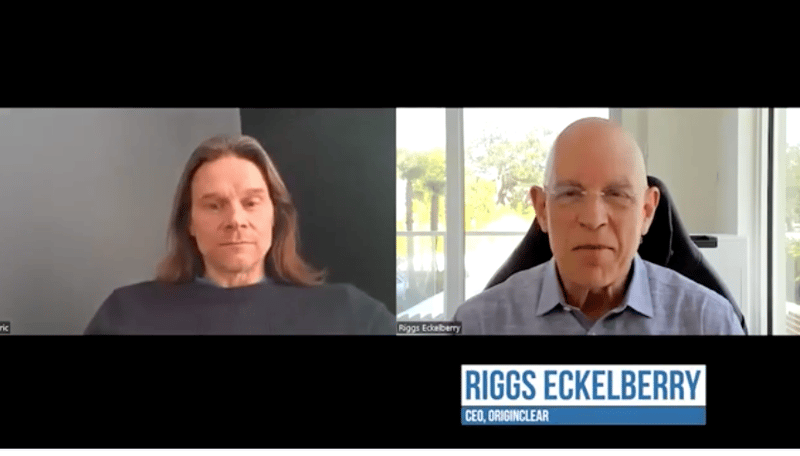
Riggs: All right. Well, here we are, December 2022. And I guess you first invested, what, about six months ago? Something like that?
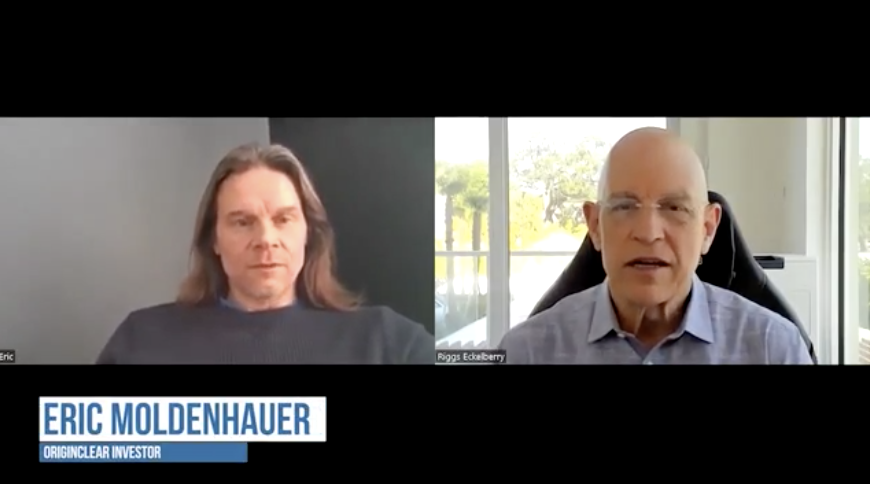
Eric: Yeah, it was about six months ago. That was the first investment. And then I kind of been keeping in touch with Ken and, you know, just kind of getting some more information. And then the other investment about maybe two months ago, maybe a month ago, and I lose track of time easily. And then we got this most recent one. So I just got the signed document and ready to make that next investment. So. Yeah.
Riggs: Yes. Well, it's amazing that we know this, that investors tend to reinvest because, well, once they're in Ken's hands, it's over.
Eric: Right? He's a good salesman.
Riggs: Yeah, but what I like about Ken is that he he addresses it from a a real pragmatic business point of view. He's an investor like you and me. You he understands what's going on out there, how few opportunities we do have these days. I sold, I was in I was in an oil and gas ETF and I bailed. I was like, this is ridiculous. I can't predict. It's not so much that it's going down or up. I can't predict it. It's like.
Eric: Yeah. Yeah. Things used to be a little more predictable before, cycles, and now it's just, it's just random chaos, basically,
Riggs: And very geopolitical. So if you have an insight on Nancy, Nancy Pelosi's trading account, you're in good shape otherwise.
Eric: Right. Yeah. And since I'm not. Yeah.
Riggs: Right. But so what? What when you first I think you responded to one of our offerings through Manhattan Street Capital. What first attracted you to the idea of OriginClear.
Eric: So the first thing that I just kind of notice is it was actually you that was on the little, you know, the ad that I saw. And I just thought it looks interesting. Like, you know, I looked at water stocks in the past and just didn't really see anything that really sparked my interest was kind of like, yeah, okay, yeah, it's just another stock, but this just looked like it offered something different. So I wanted to research a little bit more. So I started looking into it and seeing like, how is this different from the big water companies that are out there? And based on what I found is that, well, you're not the water company, right? You're the one trying to fix the water companies. And I was like, Hmm, that's probably a great idea because, you know, I tend to watch some of these documentaries about water supply and this and, you know, how our water is polluted and the, quote, truth about how our water gets polluted. And I was like, I think this company has got something here. So that was my initial reason for looking into OriginClear.
Riggs: Wow. Well, yes. And you know, what's interesting is that we're constantly refining the vision. As you know, we're most recent developments, which at the time of this recording, we can't really discuss where things might be going, but we keep like going, Oh, wow, Like almost like broken field running, right? Oh, there's a whole boom, boom, boom, boom. Right. And I think that it's just a matter of being willing to constantly reinvent like, don't you know, don't get complacent.
Like, "Well, we got the billion dollar contract. We're good now for a couple of years." You know. First of all they don't have billion dollar contracts. But so it's it makes sense that as an interloper we would question the way things are and then try to find what moves the needle, so to speak. So let me ask you, just as a general allocation, how are you invested in general, just as percentages of what to what? Not just OriginClear.
Eric: Yes, I would say I probably have right now I'm probably about 40 to 50% asset classes. So OriginClear, some, I don't know say "strip mall investments," but basically, like my grocery centered investments, so somewhat real estate, probably about 30% or so, my own personal IRA and then a lot of some in like stocks and little things here and there. So but I tend to I think over the last couple of years especially, I've gone from well, I have my IRA, which is good because I do need that. I'm hopeful years from now it'll look a little better than it does now.
Like most people I think with the asset class, there's, I think that's the biggest opportunity and that's really where I've turned my focus in the last couple of years because, you know, it's it's not just you know, it's not like, hey, let's let's invest in this startup company like you guys have been around and other ones I've invested in. I see what their vision is. And I think as an investor, if you see that vision and you agree with it, then that's what you should invest in. You know, it shouldn't just be, "Hey, I heard this might be pretty good, so I'll just throw some money into it." Like you have to believe in their vision as well. So yeah.
Riggs: Plus the stuff you hear is been fed into the media ecosystem. Oh, I somehow heard it. Yeah. That was actually planted by a good PR agency.
Eric: Right, right, right.
Riggs: But yeah, I mean, one of the things is that we've been doing this for a long time, probably too long. But by the same token, you're right that we've got tremendous amount of perspective. We have an idea of what not to do and which I think it reduces risk where we're less likely to do something stupid. Like, for example, early on we used to we used to go in California just to go after all these grants. Well, if you don't have a good lobbyist in Sacramento, good luck. Right. So so these what the problem is, these big grants, 5 million, $10 million, they would take all the air out of the room and it's all people would obsess with.
And like, I finally had to ban these things because, you know, everybody would make that their holy grail. And so we learned to just not go after these home runs because they tend to lose really lose the focus. The other thing we learned, of course, and is that I think the most precious asset you have is your long term investors. Right. And one of the things that we did that was very productive in 2018 and 2019, and we were very innovative in finding ways, most most startups to go through all this dilution and ski slope stock price and the early investors get crammed.
It's very painful. And so we figured out an innovative way which wonder of wonders, legal signed off on, to basically hit rewind. And if people would commit to more then we would, we would rescue their original investment and then protect the whole thing the way your investments relatively protected, meaning that it converts at a later price, whatever the price is, so that just,People loved us, but they were also like, Oh my gosh, what's going on here? It felt very disappointed.
Today we have, I think, a very strong base of of really all investors who were like, okay, you know, we're going to be good. This obviously it's going to be it's going to take what however long it takes, but we're going to be good. And probably that's the thing I'm most proud of, because I regardless of whether it was quote unquote, legal to to dilute everybody and hurt them in the end, it wasn't really very moral. Right.
Eric: Right, right. Yeah. But, you know, and it's, I mean, it's I think people have gotten so used to, especially in the last couple of years, kind of these fast, fast moving, like you're going to make $1,000,000 because you had the the market going crazy. You had all the crypto going crazy. I mean, I know when I was because I do have my own personal stocks and I've also fallen into that, you know. Yeah. I'm invested in this startup and now it's three years in and I was like, Okay, it's currently still starting.
But I also understand the market conditions are a big factor. But, you know, like you look at the beginning of 2021 and the market was going crazy and it was like, holy cow. You know, everybody's going to be rich. And and then you weren't because everything just, you know, it's like you want to top the ski slope and now you're at the bottom of it or you're still in the air right now wondering where you're going to land, which is, I think, most people. So, yeah, I mean, you have to you have to look at those long term investments. And that's that's typically how I think investing used to be.
And then we got away from that because that's how I was like I started putting into my 401k with my first "real job" when I was 22, 23 years old. And I always kept it in there from the, from the very first day. And it's like, yeah, you look and it fluctuates, but over time you see it keep going up, going up, you know, whereas the last couple of years everybody's like, Oh, we should be making more, which is like, no, you have to, you have to give time for these things to work themselves out. That's how real life works and companies work.
Riggs: Yep, yep, yep. I mean, how many flashes in the pan have we seen? Right? It's crazy. And it is. It's completely a hype world. I'm very interested by how how I'm always fascinated by how we're manipulated by the media and by the way, mainstream media and alternative media both. They're both everyone's got an agenda, right? And you've got to stick with the basics. And I'm, Eric, I'm really proud and thankful that you've come on board and you're not only invested once, but twice, possibly a third time. And I can tell you that, that is nothing makes me feel better than to know we have that kind of support. So, Eric, I want to thank you.
Eric: Yeah, thank you. No, that's great. I'm glad to be a board. So, yeah, I'm. I was thrilled when I got the chance to talk to Ken. And, you know, he is like, the thing that I think really kind of also wanted me to get into. This was just his vast amount of knowledge. And like you said, he can, he can really present in a down to earth way that everybody understands it and really kind of dig into some of those details. And sometimes you get into investment, you think, okay, I know your profits are supposed to be this, but I mean, he could really talk to the product and the vision and everything. And that's I really appreciate that because I know that that's an asset in itself to have him on board so.
Riggs: He's he's probably the first among equals. He's of all the people that that I work with here in the company he's super key and extremely valuable and well of course he'll hear this in blush but I'm glad to hear that. I'll let him I'll let him stay with the company for a couple of more months. Yeah.
Eric: Yeah, I think he's doing all right. So. Yeah. Plus you need someone else to join you at the end of those. Those briefings for the final 5 minutes. So.
Riggs: Freestyle. Yeah.
Eric: Yeah.
Riggs: Well, thank you very much again. And I wish you very happy holidays and let's have a wonderful 2022 together.
Eric: Yeah, Same to you. Thank you. And I appreciate the opportunity to talk to you and look forward to great things.
Riggs: Thank you, Eric.
Riggs: Beautiful thing. Beautiful thing. So Ken, your ears must be burning.
Ken: Everyone is so nice to me. Can we just, can we just end it now? You know what I mean? Like, everyone was so...
Riggs: Torture begins.
Ken: You're supposed to end on a high note, right? So.
Riggs: Are you really in discussion? Well, we've got all kinds of positive stuff. And in fact, Paul Fetscher has pointed out to us that Tulsa has the center of the universe, or so they call one particular location. But anyway, Eric was just wonderful guy today.
Ken: It was really great, super smart guy, very laid back kind of regular guy. But he's I don't think he minds me saying this. An interesting fill in the fact that he worked his whole life, owned a business, sold it at a relative, I mean, he's a relatively young man. So his investment performance is a little more important than a lot of men his age, right? Because he sold his business. And that was like the thing he worked for so many years. And it was quite valuable, but he's got to make that work, you know?
So he's made it a particularly keen interest of his to tune in. We spent a lot of time talking about geopolitics and it's funny, a lot of our investors, I find that more of our, our insights align than not. I think there's a, folks that are in the world that we travel and have a certain way of viewing things. Like you talked about media. You know, the news will tell you what they think you want to hear or what they want you to hear, what they want you to think. Financial news is no different. Look at Jim Cramer.
Riggs: Yeah, he's the best.
Ken: I mean, he's like, really? You know.
Riggs: Let's not confuse entertainment with information, right? Anyway, I think it was a good show tonight. The Masterminds event was great. And we'll do the slide show version next week. They are wonderful people. Substantial number of them have invested, in fact, through the efforts of Ivan Anz and the PhilanthroInvestors network. And I believe we'll be seeing more of that. And Ivan, in fact, says here, 2023 is our year amigos. Thank you for keeping the ball rolling and even stronger and making our Water PhilanthroInvestors happy. So I'm going to close it on this note. I'm just going to give the contact information so people can completely slam Ken's.
Ken: Nothing going on. It's fine.
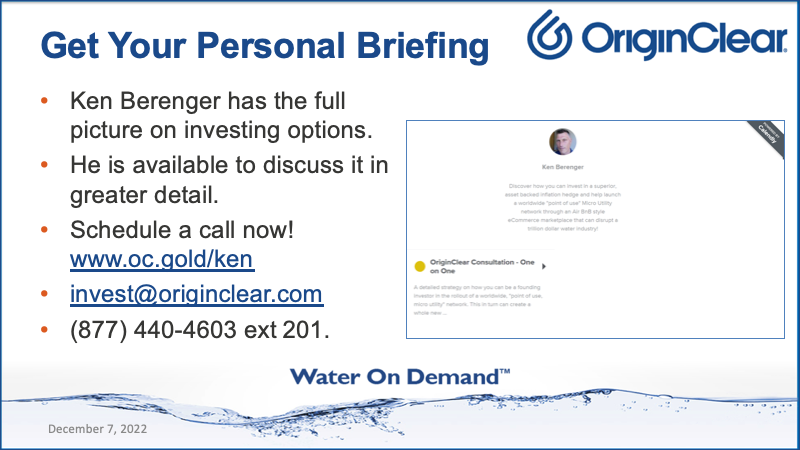
Riggs: Exactly. Yeah. Yeah. It's like, "Dude, why aren't you responding to my chats? Oh, I guess you're on the phone." Anyway. Just oc.gold/ken. You'll be talking to him. Tom Liakos goes, "Thank you very much." James Wright, "Good night, all." And Linda Roeten I did notice your wonderful statement, so much appreciated that, "Anyone who really listens to what Ken and you present to everyone would and should jump in with both feet." And of course, they both, the Roetens have done so. Robert Baxter, "Thanks, guys." Paul Fetscher. He says he's executed the NDA on this cool thing. A Marcus Walker wants to know how you can invest. I will help him out with that. So Marcus, just go to o.gold/ken, schedule it and you'll find out everything. Everyone, thank you very much. We're getting closer and closer to the end of the year. We're rushing to get these final huge things happening. With that, I'm going to wrap it up because it is nine-o-one PM and I like to keep it under an hour
Ken: Turn into pumpkins now.
Riggs: Exactly. Exactly. Thank you, everyone. We're having a better and better time. This is the best. Goodnight, everyone, and catch you next week. There'll be more good stuff. Take care.
%20250px.png?width=250&height=53&name=OriginClear%20Logo%202019%20(RGB)%20250px.png)



